Haydn String Quartets: The Lindsays
Introduction
In 2004, while in residence at the Kuhmo Chamber Music Festival in Finland, the Lindsay String Quartet recorded seven of the quartets written by Joseph Haydn. Each performance, either in front of an audience, or recorded especially for TV, is introduced by the quartet.
The disc also includes the documentary "4 Better 4 Worse - The Anatomy of a String Quartet" by Reiner E. Moritz, described on the cover as "an in-depth filmic portrait of The Lindsays", but also includes contributions by the Jean Sibelius Quartet from Finland, The Auer Quartet from Hungary, and the Danel Quartet from Belgium.
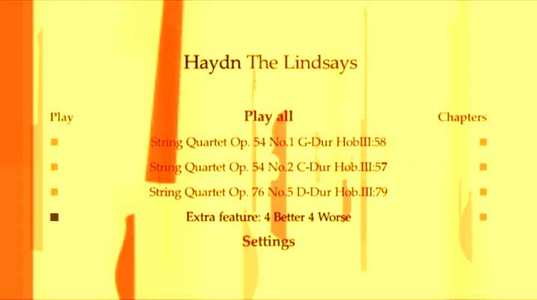
Video
The disc is presented in anamorphic widescreeen (16:9) and the quality of the picture is absolutely fine. Some more scenic shots of Finland would have been nice, but probably a little pointless considering the subject matter of the DVD. The camera shots of the quartets are suitably `intimate`, but Peter Cropper`s grimacing appears even more grotesque than usual when his face fills up your TV screen

Audio
Audio-wise, there is nothing to complain about, as we can listen in LPCM stereo or DTS surround, but the latter may be a bit of overkill for the music we are offered. In this case, the stereo option is far more suitable.
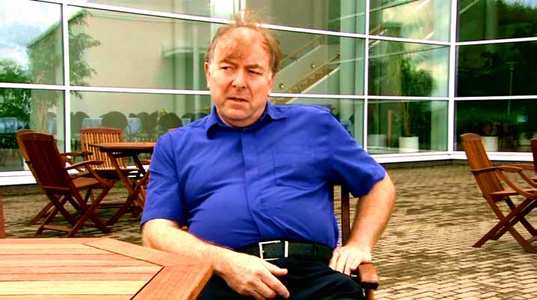
Features
Even though the 50 minute film mentioned above is described as as an extra feature (on disc 2), it acts as the perfect accompaniment to the main `feature`. We get to hear several explanations of what it means to be a string quartet (the group, not the type of composition) from each of the players, and the artistic directors of the festival where the performances were filmed. Each description is perfectly valid, but perhaps the best is "it is like a marriage, but without any of the compensations".
Menus are easily navigable, and we are able to hear the performances on their own (without the introductions) if we want. It`s a little annoying to have every piece cordoned off in its own little programme (with titles and credits), but this is a minor quibble.
Subtitles are provided in English, German, Spanish, French and Italian, and for some reason, the German subtitles pop up automatically after each disc was put in., but this was easily solved.
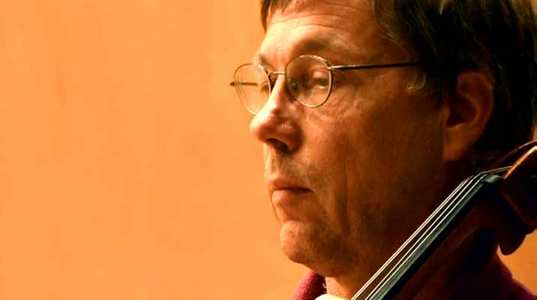
Conclusion
It`s a shame that we have only seven of the Haydn quartets on the disc, or indeed, that we didn`t have a selection of quartets composed by Haydn onwards, as the `extra` documentary almost demands a disk of quartets by a major composers from the following centuries. Beginning with Haydn, and ending with Tippett, for example, would have been a wonderful demonstration of the different styles of playing needed for the same ensemble which has stood the test of time more than most styles of music.
However, what we have is a very fine record of a quartet, perhaps a touch past their peak, but still great to watch, who are obviously so in tune with the genre that everything they do appears to be the correct way of playing. We learn through the documentary that The Lindsays, and indeed the other quartets we hear, will most likely play the same pieces differently the next time they see the music. Everything seems even more like a marriage when you look at the completely uninterested expessions of the other three members of each ensemble when one is waxing lyrical about their role in the group.
Overall, the performances are very good, sometimes suffering from a but of scrappiness here and there, but as Bernard Gregor-Smith (cello) says, quoting a member of the Amadeus Quartet, all quartets have to face a big problem at the start - intonation, and after playing together for 40 or 50 years, they have to face a big problem at the end - intonation.
This is a fascinating example of musicianship overcoming what everyone is used to in live performances. Whatever you may find to criticise here, there are many more things to admire, and this DVD is required for anyone who thinks chamber music is uninteresting. A string quartet is likely to be the most intimate and personal statement that a composer can make, and the selection of Haydn works available here will be a fine introduction to those who are unfamiliar with the music, and a reminder to any young quartet about what can be achieved if you stick together for a few decades.
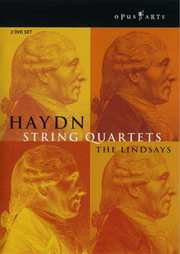
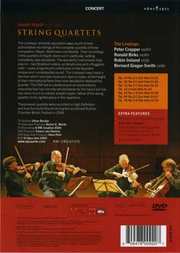




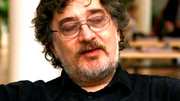
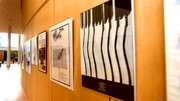
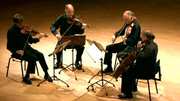
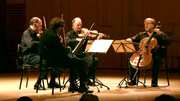
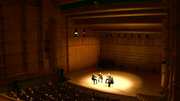

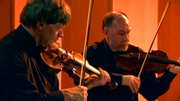
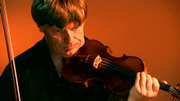
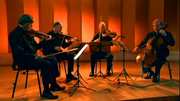
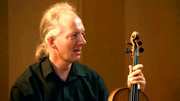
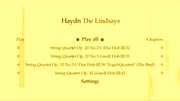






























Your Opinions and Comments
Be the first to post a comment!